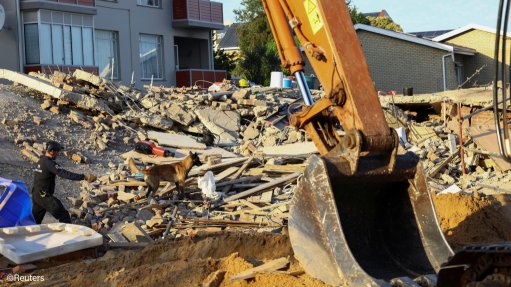Competition Commission Guidelines may be an effective intervention to move the steel sector into economic recovery
This article has been supplied as a media statement and is not written by Creamer Media. It may be available only for a limited time on this website.
The South African Iron and Steel Institute (SAISI) believes the Guidelines on Collaboration, published by the Competition Commission last year, enabling collaboration between competitors on localisation initiatives, is a commendable response to the government’s Economic Reconstruction and Recovery Plan.
This is because the localisation imperatives contained in The South African Steel and Metal Fabrication Master Plan 1.0 (the Steel Master Plan) will require businesses at all levels of the value chain to give serious consideration to the opportunities presented by the Guidelines. In particular, given the weak local trading conditions and challenging export market, collaboration has become increasingly crucial for the survival of the steel industry.
The Steel Master Plan notes that “the over-capacity in the industry is a major problem, especially but not only in long steel products. The consolidation of the industry is urgent. The most significant imbalance between supply and demand is in long steel products because of the effect on price. The structural overcapacity of long steel products with prices which are extremely low in global terms means that all the plants are fighting for sales volumes to run their mills efficiently. Since profits are not possible through revenue, the focus is on cost reduction (including steelmakers using electric furnaces), but that has left many of the mills in a weak position financially. The industry should be allowed to discuss options, under supervision and with conditions….“
The Guidelines acknowledge that competitor collaboration may be required to help advance localisation initiatives, identifying four types of collaboration and providing corresponding competition law compliance guidance. These are the identification of opportunities for localisation initiatives at industry level; the process of setting industry local procurement targets; the process of setting individual company local procurement targets; and demand forecasting.
The Competition Commission prescribes the following broad principles in respect of the collection and sharing of information about the industry:
The sharing of information must be facilitated by an independent third party to allow for information to be aggregated and eliminate the risk of collusion.
Exclusion of competitively sensitive information such as prices, customer lists, production costs, quantities, turnovers, sales, capacities, marketing plans, risks, investments, and technologies, unless under very strict conditions.
Government policymakers usually require information, and it is perfectly legitimate from a competition perspective for policymakers and regulators to collect and process information from market participants and for firms to provide the relevant information.
Meetings between competitors must be minuted and notified to the Commission within a reasonable time. The Commission may request access to the recording or minutes of these meetings at any time.
Within the prevailing challenging economic climate, the Guidelines appear to be a step in the right direction in supporting local economic recovery. However, it remains to be seen if the benefit to be derived would be worthwhile given the prescribed administrative process and the exposure associated with the disclosure requirements. In addition, given the non-binding nature of the guidelines on the Commission, the Tribunal, or the Competition Appeal Court, businesses may also be justifiably sceptical about the degree, if any, of protection offered by the Guidelines.
SAISI calls on the Commission to be proactive in reviewing and adjusting the Guidelines to ensure that these are an effective intervention to move the South African steel sector into economic recovery that could translate in jobs, investment and economic growth.
Comments
Announcements
What's On
Subscribe to improve your user experience...
Option 1 (equivalent of R125 a month):
Receive a weekly copy of Creamer Media's Engineering News & Mining Weekly magazine
(print copy for those in South Africa and e-magazine for those outside of South Africa)
Receive daily email newsletters
Access to full search results
Access archive of magazine back copies
Access to Projects in Progress
Access to ONE Research Report of your choice in PDF format
Option 2 (equivalent of R375 a month):
All benefits from Option 1
PLUS
Access to Creamer Media's Research Channel Africa for ALL Research Reports, in PDF format, on various industrial and mining sectors
including Electricity; Water; Energy Transition; Hydrogen; Roads, Rail and Ports; Coal; Gold; Platinum; Battery Metals; etc.
Already a subscriber?
Forgotten your password?
Receive weekly copy of Creamer Media's Engineering News & Mining Weekly magazine (print copy for those in South Africa and e-magazine for those outside of South Africa)
➕
Recieve daily email newsletters
➕
Access to full search results
➕
Access archive of magazine back copies
➕
Access to Projects in Progress
➕
Access to ONE Research Report of your choice in PDF format
RESEARCH CHANNEL AFRICA
R4500 (equivalent of R375 a month)
SUBSCRIBEAll benefits from Option 1
➕
Access to Creamer Media's Research Channel Africa for ALL Research Reports on various industrial and mining sectors, in PDF format, including on:
Electricity
➕
Water
➕
Energy Transition
➕
Hydrogen
➕
Roads, Rail and Ports
➕
Coal
➕
Gold
➕
Platinum
➕
Battery Metals
➕
etc.
Receive all benefits from Option 1 or Option 2 delivered to numerous people at your company
➕
Multiple User names and Passwords for simultaneous log-ins
➕
Intranet integration access to all in your organisation


















